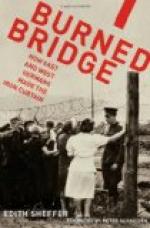What folk were out of doors bent their eyes upon the canoe. The factor himself rose from his seat on the porch and came down to have speech with them. Thompson, recognizing authority, made known his name and his mission. The burly Scot shook hands with him. They walked away together, up to the factor’s house. On the threshold the Reverend Wesley paused for a backward look, drew the crumpled linen of his handkerchief across his moist brow, and then disappeared within. Mike Breyette and Donald MacDonald looked at each other expressively. Their swarthy faces slowly expanded in a broad grin.
In the North, what with the crisp autumn, the long winter, and that bleak, uncertain period which is neither winter nor spring, summer—as we know it in softer lands—has but a brief span to endure. But Nature there as elsewhere works out a balance, adheres to a certain law of proportion. What Northern summers lack in length is compensated by intensity. When the spring floods have passed and the warm rains follow through lengthening days of sun, grass and flowers arise with magic swiftness from a wonderfully fertile soil. Trees bud and leaf; berries form hard on the blossoming. Overnight, as it were, the woods and meadows, the river flats and the higher rolling country, become transformed. And when August passes in a welter of flies and heat and thunderstorms, the North is ready once more for the frosty segment of its seasonal round. July and August are hot months in the high latitudes. For six weeks or thereabouts the bottom-lands of the Peace and the Athabasca can hold their own with the steaming tropics. After that—well, this has to do in part with “after that.” For it was in late July when Wesley Thompson touched at Fort Pachugan, a Bible in his pocket, a few hundred pounds of supplies in Mike Breyette’s canoe, certain aspirations of spiritual labor in his head, and little other equipment to guide and succor him in that huge, scantily peopled territory which his superiors had chosen as the field for his labors.
When Breyette and MacDonald had so bestowed the canoe that the diligently foraging dogs of the post could not take toll of their supplies they also hied them up to the cluster of log cabins ranging about the Company store and factor’s quarters. They were on tolerably familiar ground. First they made for the cabin of Dougal MacPhee, an ancient servitor of the Company and a distant relative of Breyette’s, for whom they had a gift of tobacco. Old Dougal welcomed them laconically, without stirring from his seat in the shade. He sucked at an old clay pipe. His half-breed woman, as wrinkled and time worn as himself, squatted on the earth sewing moccasins. Old Dougal turned his thumb toward a bench and bade them be seated.
“It’s a bit war-rm,” MacDonald opined, by way of opening the conversation.
“What else wad it be this time o’ year?” Dougal rumbled. “Tell us somethin’ we dinna ken. Wha’s yon cam’ wi’ ye?”




